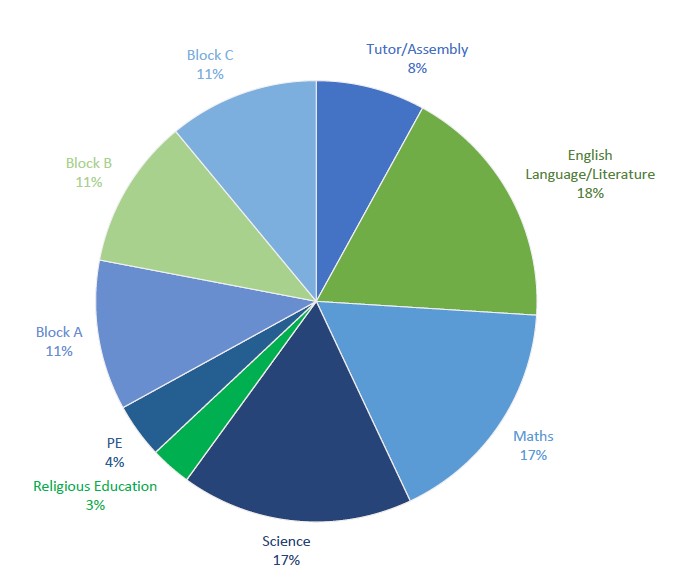What do the pathways mean?
The Academy has designed pathways for its students at Key Stage 4 (Years 10 and 11). The pathways are decided based on students’ prior attainment in their subjects from when they started at the school. We were the 69th best school in the UK for student progress last year out of over 6,000 schools, so we have a lot of experience and success with getting students to pick the right pathways. We ensure students take courses that are suitable for them and give them the best possible chance of success. All students in KS4 study a core of required subjects. These include:
- English Language GCSE
- English Literature GCSE
- Maths GCSE
- Science GCSE
- RE GCSE
- Core PE
A is the EBacc GCSE pathway for students with the highest prior attainment. These students will pick either Geography or History, then French or Spanish, and finally a further GCSE or BTEC course of their choice.
B is the EBacc Vocational pathway. These students will pick either Geography or History, then French or Spanish and finally one BTEC qualification of their choice or Art GCSE.
C is the Vocational pathway. These students will pick two BTEC courses or one BTEC and Art GCSE, and then pick one further GCSE subject.
D is the Vocational Support pathway. This is for students that need extra support in English and Maths. These students will pick two BTEC courses or one BTEC and Art GCSE. They will not choose another subject as instead they will get more support in English and Maths to help their grades in these subjects.
What is the EBacc?
The English Baccalaureate is not a qualification in itself; it is a group of qualifications in ‘facilitating’ subjects – these are subjects which develop good learning skills, and which universities consider to be useful for higher education.
Taking the EBacc is about having a wide range of these subjects and keeping your options open for studies at Key Stage 5. Although it is important to be aware that the EBacc is not needed to go to university, though there are some universities that require a GCSE in a language.
In order to achieve the English Baccalaureate, you will need a good GCSE grade (9-5) in English, Maths, Science, a Modern Foreign Language, and History or Geography.
What will my timetable look like?
At Paddington Academy we have a two-week timetable. Over the fortnight, students attend three 100-minute lessons daily. In addition to this, on Monday- Thursday, students have a 35-minute pastoral tutor session or assembly.
Students have 30 lessons a fortnight. For all KS4 students, 17 of these lessons are dedicated to English, Maths and Science. Core time is also dedicated to RE and PE. Options subjects have either three or four lessons a fortnight.
Students in Year 11 receive the additional provision of an extra lesson or supervised independent study Tuesday-Thursday, and targeted support sessions.

What are the different course types on offer?
GCSE (General Certificate of Secondary Education)
With a GCSE you gain a grade from 9-1 (with 9 being the highest grade). The course consists of mostly examinations taken at the end of Year 11 but there are some elements of coursework or controlled assessment in some subjects. Some GCSE courses are very practical, such as GCSE Art or Drama.
BTEC (Business and Technology Education Council award)
With a BTEC you learn about a subject in a more practical, work related manner. Assessment is spread out across Years 10 and 11. These courses are for those who prefer to do more coursework, and who enjoy independent learning and practical activity. There will also be an examination and you must pass this in order to pass the course. You can achieve Pass, Merit or Distinction. These Level 2 courses are the equivalent to one GCSE.
You can find out more about a particular course by reading the page in this booklet or speaking to the teacher leading the course.
How do I make my options choices?
What should you consider when choosing options subjects?
What are common mistakes made when choosing options subjects?
- Choosing an option because all your friends are doing it
- Choosing based on the teacher(s)
- Choosing because you’ve never done the subject before, so it must be good
- Deciding without reading this booklet, asking questions, and speaking to teachers
- Deciding without discussing it with your family
- Deciding against a subject because you don’t want a career in it